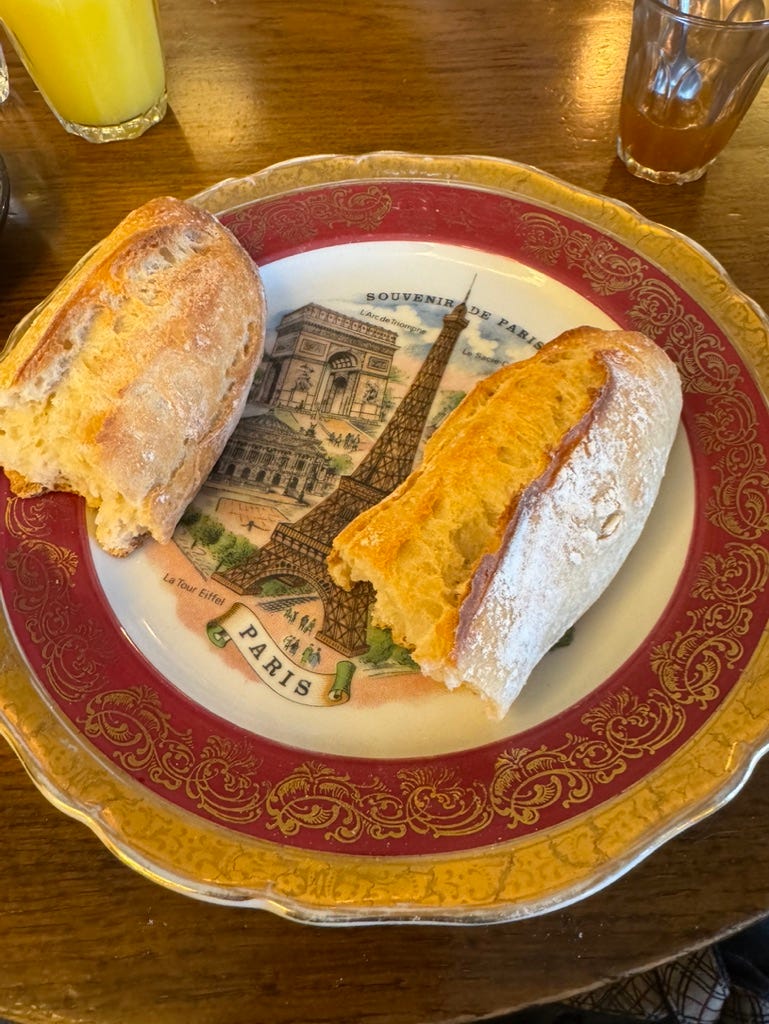I joke that this series (you can subscribe for free) should be called Elderly In Paris, but I feel the opposite of old here. This is probably because I’m relearning basic stuff, like how to talk and how to eat, mostly from French waiters.
Take, for example, the quiet scolding my sister and I got from a tall, bespectacled server at a small family-run restaurant near the Canal St. Martin. He has a way of just standing by the table that is both polite and demanding of attention. On this night, he raised his eyebrows at a plate with the remnants of the homemade duck rillette. We’d eaten the meaty part with bread, the only bit left was a thick line of bright white fat that looked like Crisco. We said we were finished, and he shook his head, disappointed: “But you have left the fat. It is the best part.”
I should say here that duck rillette is mostly fat to start with. It’s shredded meat cooked in duck fat and then mixed with lots more duck fat – like a literal coup de gras. Or, in American terms, that insane Pizza Hut pizza where they stuff cheese into the crust. And the pure fat part just didn’t look right. We shook our heads right back at him. Mr. Waiter held his ground, refusing to take the plate. “It’s March; you should eat that,” he said as if it were obvious. Then he leaned in: “Everyone gets sick in March, duck fat keeps you healthy. It’s good for you!”
Uh huh. This is the kind of thing French people say they’re trying to get you to eat weirdly chewy veal kidneys, I thought. But it would be humiliating to wimp out. So my sister and I looked at each other and nodded like: We will eat this fat like the worldly people we say we are.
It was gorgeous. Light and fluffy, sort of salty—like a more flavorful cousin of whipped butter. It’s surely what they put on your baguette in heaven. We mopped up every bit and prepared to meet our maker via some sort of coronary event. This blatant decadence couldn’t go unpunished. Could it?
We think like this because we are American women and suspicious of pleasure. People of our demographic talk about food in terms of sin and penance, good and bad. We atone for last night’s key lime pie with this morning’s virtuous kale juice. If we indulge in something delicious, we say we’ve been “bad,” and if we are parsimonious, withholding, or puritanical with food, we say we’re being “good.”
Truth is, dietary balance is worthy, but punitive eating is exhausting. And damn if Mr. Waiter wasn’t right about duck fat. It’s the olive oil of the animal fat world.
For my first six weeks in Paris, I ate a baguette tartine every morning and waited for the thunderbolt or the belly roll. I thought I must stop this indulgence and get back to low-fat yogurt. This bread is too good, and I like it too much. I don’t deserve it, but it is just so delicious to start the day this way.
Then I looked around at all the regulars eating their breakfast bread with coffee, and none of them looked bloated or heavy. Au contraire! This country consumes 30 million baguettes a day, almost half a loaf per person. And I wasn't gaining weight either. Yes, I walk a lot here, but I also walk a lot in New York.
This is where I explain that, by law, traditional French baguettes can only be made with four ingredients. There are no preservatives. Bread that is not fabricated to stay soft for a week must digest better. But that’s not what feels so new. It’s this expectation that food is to be loved not bargained with.
And dear reader, maybe you’re not neurotic about eating, so this makes no sense to you. It’s true I don’t come to this subject as a completely sane person. I spent my teens eating frosting out of a can in the middle of the night after an evening shift at a nursing home. I barely tasted it. It didn’t taste good; it felt shameful, like illicit compensation for my troubles.
The thing is, even some of my friends who didn’t grow up in Calvinist New England have trouble believing they deserve buttered bread or long vacations unless they feel they have suffered and overworked for it in advance or that they’ll make up for the indulgence later.
But what if stressing over all this is what’s making us sick, not the duck fat?
The other day, a sweet cafe server circled back when she saw I’d left most of my chocolate mousse in the dish. “Did you not enjoy it?” she asked with furrowed brow, like she’d failed me. I apologized for insulting the mousse. And just like that, I went from feeling horrible for eating too much mousse to begging forgiveness for not finishing it. What a world. I’ll let you know if I blow up like a cartoon balloon lady, but for now, I’ll eat the baguette.
Herewith some delightful reader comments from my last piece: On Being Very Wrong In French
French Prayer:
May you go softly and sweetly,
Collecting patience,
As you cross the bridge of love
into your precious reactivity.
Not a bad summary of your post.
Hi Susanna!
As a Frenchman in the US, I had a symmetrical experience. I remember the first few times people would ask me " are you enjoying yourself " which, translated literally in French, would mean " are you giving yourself an orgasm?" Although I knew they did not mean to pry, it was hard not to look horrified.
Sadly, comes a day when everything feels normal. So, enjoy yourself in Paris while it lasts!
Emmanuel.
OBLIGATORY DOG PICTURE:
RELATED:
On Leaving Brooklyn for Paris
Well hello! Hope you enjoy this new weekly dispatch from Paris. It’s free, and it’s about what happens when you upend your life to be in the place you love even though it’s far from the people you love. I’m writing to you from Canal St. Martin, a village-like neighborhood in the north of Paris. I showed up here in January with two suitcases and a smal…








Thank you for reminding me to live life instead of analyzing it...
Always have the baguette…and the croissant, butter and cheese!